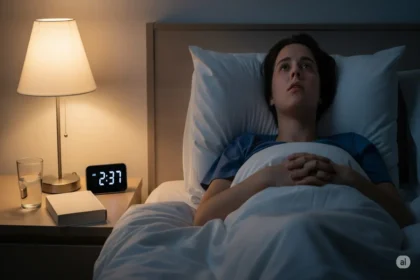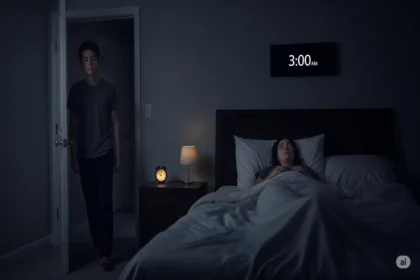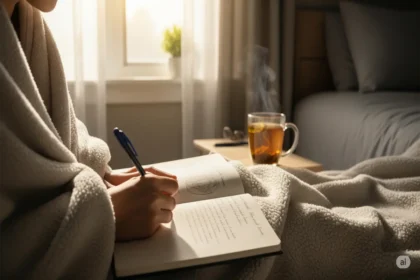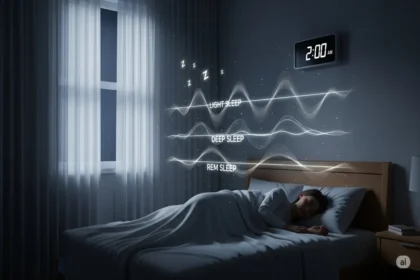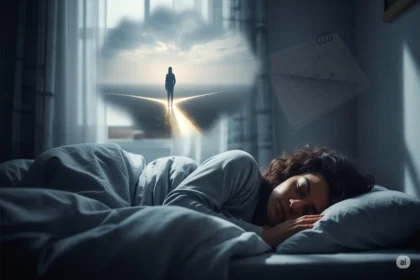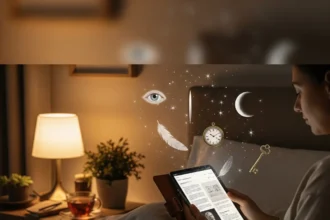The modern world often feels like a relentless treadmill, constantly demanding more from us. Deadlines loom, responsibilities mount, and the digital hum of constant connectivity keeps our minds buzzing. It’s no wonder that for many, the quiet hours of the night, meant for rest and rejuvenation, become a battleground. The pervasive presence of Stress & Anxiety in our daily lives isn’t just a mental burden; it’s a powerful, often hidden, force that profoundly disrupts our sleep, creating a vicious cycle that leaves millions feeling perpetually exhausted, irritable, and overwhelmed. Understanding this intricate, bidirectional relationship is the first step towards reclaiming peaceful nights and more resilient days.
Imagine Sarah, a project manager, lying in bed, her mind racing. She replays conversations from the day, worries about an upcoming presentation, and mentally drafts tomorrow’s to-do list. The harder she tries to sleep, the more elusive it becomes. Her heart pounds, her muscles tense, and the clock ticks relentlessly. She eventually drifts off, only to wake feeling unrefreshed, her anxiety levels already high before her feet even hit the floor. This isn’t just a bad night; it’s a classic illustration of how stress and anxiety hijack our sleep architecture, transforming the sanctuary of the bedroom into a stage for nocturnal turmoil.
The Brain’s Alarm System: How Stress Hijacks Sleep
To grasp the profound link between stress, anxiety, and sleep, we must first understand the body’s stress response system. When faced with a perceived threat – whether it’s a saber-toothed tiger or a looming work deadline – our sympathetic nervous system, often called the “fight or flight” response, kicks into gear.
This activation triggers a cascade of physiological changes:
- Release of Stress Hormones: The adrenal glands flood the body with cortisol and adrenaline (epinephrine). Adrenaline provides an immediate burst of energy and heightened alertness, while cortisol sustains this response.
- Increased Heart Rate and Blood Pressure: Your cardiovascular system prepares for action.
- Muscle Tension: Muscles tense, ready for flight or defense.
- Heightened Alertness: The brain becomes hyper-vigilant, scanning for threats.
This system is designed for short-term survival. The problem arises when this “fight or flight” response becomes chronically activated due to persistent stress or anxiety. The body remains in a state of high alert, making it incredibly difficult to transition into the relaxed state necessary for sleep.
Sleep, particularly the deeper stages of NREM (Non-Rapid Eye Movement) and REM (Rapid Eye Movement) sleep, requires the activation of the parasympathetic nervous system, the “rest and digest” system. When stress hormones are elevated, and the sympathetic nervous system is dominant, the body is essentially trying to hit the brakes and the accelerator simultaneously. The result is often fragmented sleep, difficulty falling asleep (sleep onset insomnia), or frequent awakenings during the night (sleep maintenance insomnia).
The Vicious Cycle: When Lack of Sleep Fuels More Stress
The relationship between stress, anxiety, and sleep is not a one-way street; it’s a powerful, self-perpetuating cycle. While stress and anxiety disrupt sleep, insufficient sleep, in turn, exacerbates stress and anxiety, creating a downward spiral.
When we are sleep-deprived:
- Exaggerated Emotional Responses: The amygdala, the brain’s emotional processing center, becomes hyperactive and less regulated by the prefrontal cortex (responsible for rational thought and emotional control). This means we react more intensely to stressors, become more irritable, and are less able to manage our emotions. A minor inconvenience can feel like a major catastrophe.
- Impaired Stress Coping: Sleep is crucial for replenishing our mental and emotional reserves. Without adequate rest, our capacity to cope with daily stressors diminishes, making us feel overwhelmed more easily.
- Increased Cortisol Levels: Ironically, chronic sleep deprivation itself can lead to elevated levels of cortisol, further perpetuating the “fight or flight” state and making it even harder to sleep.
- Cognitive Impairment: Sleep deprivation impairs cognitive functions like problem-solving, decision-making, and concentration. This can make daily tasks feel more challenging, leading to increased frustration and anxiety about performance.
Consider a real-world example: A student facing exam pressure experiences heightened anxiety, leading to difficulty sleeping. The subsequent lack of sleep impairs their concentration and memory, making it harder to study effectively, which in turn increases their anxiety about the exam, further disrupting sleep. This feedback loop can be incredibly difficult to break without targeted intervention.
Specific Sleep Problems Fueled by Stress and Anxiety
Stress and anxiety don’t just cause general restlessness; they can trigger or worsen specific sleep disorders and phenomena:
1. Chronic Insomnia
This is the most direct link. Acute stress (e.g., a job interview, a family crisis) can cause temporary insomnia. However, if this stress becomes chronic, or if the individual develops anxiety about not sleeping, acute insomnia can transition into chronic insomnia. The fear of not sleeping creates a performance anxiety around bedtime, making sleep even more elusive. The bed becomes associated with worry and frustration rather than rest.
2. Nightmares and Vivid Dreams
While dreams are a normal part of sleep, high levels of stress and anxiety can lead to more frequent, intense, and disturbing nightmares. REM sleep is crucial for emotional processing, and when the brain is overloaded with stress during the day, it may work overtime during REM sleep to process these emotions, leading to more vivid and often negative dream content. Waking from a nightmare can further disrupt sleep and heighten anxiety.
3. Sleep Paralysis
As discussed in other contexts, sleep paralysis, the terrifying experience of waking up paralyzed but conscious, can be triggered or exacerbated by stress, anxiety, and irregular sleep schedules. The brain’s heightened state of arousal and the disruption of smooth transitions between sleep stages make these episodes more likely. The fear associated with sleep paralysis can then fuel further anxiety about falling asleep.
4. Bruxism (Teeth Grinding)
Many people unknowingly grind or clench their teeth during sleep (bruxism). While various factors contribute, stress and anxiety are major culprits. The tension from daytime stress can carry over into sleep, leading to involuntary jaw clenching. Chronic bruxism can cause jaw pain, headaches, damaged teeth, and further disrupt sleep quality.
5. Restless Legs Syndrome (RLS) Exacerbation
While RLS is a neurological disorder, its symptoms (the irresistible urge to move the legs, often with uncomfortable sensations) can be worsened by stress and anxiety. The heightened state of arousal makes it harder to ignore the sensations and find relief, further delaying sleep onset.
Breaking the Cycle: Strategies for Restful Nights
Recognizing the profound connection between stress, anxiety, and sleep is the first step. The good news is that by addressing either side of the equation, you can positively impact the other, ultimately breaking the vicious cycle.
1. Prioritize Sleep Hygiene: The Foundation
Even when stressed, consistent sleep habits are crucial:
- Consistent Schedule: Go to bed and wake up at the same time every day, even weekends. This regulates your circadian rhythm.
- Optimize Environment: Ensure your bedroom is dark, quiet, cool (60-67°F or 15-19°C), and comfortable.
- Wind-Down Routine: Create a relaxing ritual 30-60 minutes before bed. This might include a warm bath, reading a physical book, gentle stretching, or listening to calming music.
- Avoid Stimulants/Screens: Limit caffeine and alcohol, especially in the afternoon/evening. Disconnect from all electronic screens at least an hour before bed to avoid blue light and mental stimulation.
2. Stress and Anxiety Management Techniques: Targeting the Root Cause
Directly addressing stress and anxiety is paramount:
- Mindfulness and Meditation: Practices like mindfulness meditation can train your brain to observe thoughts and feelings without judgment, reducing rumination and anxiety. Even 10-15 minutes daily can make a difference.
- Deep Breathing Exercises: Simple techniques like diaphragmatic breathing can activate the parasympathetic nervous system, promoting relaxation.
- Regular Exercise: Physical activity is a powerful stress reliever. Aim for at least 30 minutes of moderate exercise most days, but avoid intense workouts too close to bedtime.
- Journaling: Writing down your worries before bed can help offload them from your mind, preventing them from racing once you’re trying to sleep.
- Time Management and Boundaries: Learn to manage your time effectively, delegate tasks, and set boundaries (e.g., no work emails after a certain hour) to reduce feeling overwhelmed.
- Nature Exposure: Spending time outdoors, particularly in green spaces, has been shown to reduce stress and improve mood.
3. Cognitive Behavioral Therapy for Insomnia (CBT-I)
For chronic insomnia fueled by anxiety, CBT-I is considered the gold standard treatment. It’s a structured program that helps individuals identify and challenge unhelpful thoughts and behaviors about sleep. It includes techniques like:
- Cognitive Restructuring: Learning to reframe anxious thoughts about sleep.
- Stimulus Control: Re-associating the bed with sleep, not wakefulness or worry.
- Sleep Restriction: Temporarily limiting time in bed to build up sleep drive.
- Relaxation Training: Teaching progressive muscle relaxation or guided imagery.
CBT-I is highly effective because it addresses the psychological and behavioral components of insomnia, which are often exacerbated by stress and anxiety.
4. Professional Support
If stress, anxiety, and sleep problems are persistent and severe, seeking professional help is crucial.
- Therapy: A therapist can help you develop coping strategies for stress and anxiety, identify underlying issues, and provide tools like CBT for anxiety.
- Medical Consultation: Your doctor can rule out any underlying medical conditions contributing to your symptoms and discuss potential medication options for severe anxiety or sleep disorders, if appropriate.
Conclusion: Reclaiming Peace, One Night at a Time
The hidden link between stress, anxiety, and sleep problems is a powerful testament to the interconnectedness of our minds and bodies. In a world that often glorifies constant activity and downplays the need for rest, understanding this link is not just an academic exercise; it’s a vital step towards self-preservation. When stress and anxiety hijack our nights, they steal not just sleep, but our capacity for joy, resilience, and optimal functioning during the day.
However, the cycle is not unbreakable. By consciously prioritizing sleep, implementing effective stress management techniques, and seeking professional support when needed, we can begin to untangle the knotted threads of worry and wakefulness. Reclaiming restful nights is not a luxury; it’s a fundamental act of self-care that empowers us to face the challenges of life with greater clarity, emotional balance, and renewed energy. It’s about finding peace not just in our waking hours, but in the profound quiet of a truly restorative sleep.
Disclaimer: The information provided in this article is for general informational purposes only and does not constitute medical advice. It is not a substitute for professional medical advice, diagnosis, or treatment. Always seek the advice of your physician or other qualified health provider with any questions you may have regarding a medical condition. Never disregard professional medical advice or delay in seeking it because of something you have read on this website.



